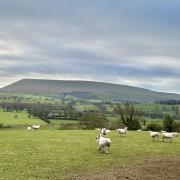The buzz you get from this play, at Lancaster’s Dukes Theatre, is the kind that keeps your mind racing - long after - says David Upton
Mosquitoes is about life, the universe and everything – but is so much more than that.
Writer Lucy Kirkwood made her name with the award-winning Chimerica, later made into a TV series, and has set a standard for turning epic stories into highly personal and accessible drama.
Here her dizzyingly brilliant narrative revolves around a scientist whose work on the Large Hadron Collider, and its hunt for the missing ‘God particle’, spins into her personal life. She has already lost her partner; risks losing her teenage son; has a sister coping uneasily with her own loss; and a mother losing her faculties.
If you think that’s enough harm for one evening, then add in anti-vaxxing conspiracies, euthanasia, faith, over-population, even personal hygiene!
There’s also a mini masterclass on the incipient perils of sexting, probably an instructive one given the average age of contemporary theatre audiences. The dark humour this generates quickly turns to horror at the scale of the anti-social media it creates. Just typical of Kirkwood’s mastery of creating complex characters and giving them motivation and language that pulses with reality.
The 2017 premiere at the National Theatre starred Olivia Colman and Williams as the warring sisters, which gives some idea of the play’s calibre.
Now viewed, on the other side of our ‘Covid and Chaos’ times, many of its themes take on wider significance, not least the place of science in our lives.
This production, from St Albans-based OVO theatre company, is given a kinetic energy by director Adam Nichols and movement directors Stephanie Allison and Amy Connery, aided by Simon Nicholas’s overhead projections.
The physical and emotional brunt of nearly three hours of intense drama is borne by a highly-competent ensemble of Emma Wright, Faith Turner, Will Pattle, Annette Holland, Lyle Fulton, Eloise Westwood, Jane Withers and Andy Margerison – the latter as the particle part of Boson!
And how many plays can offer an ending that can be both grimly pessimistic, and optimistic?
All becomes clear . . . amidst one of those moments of theatre it is a privilege to witness.



























